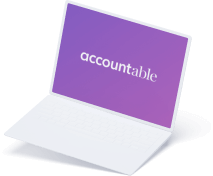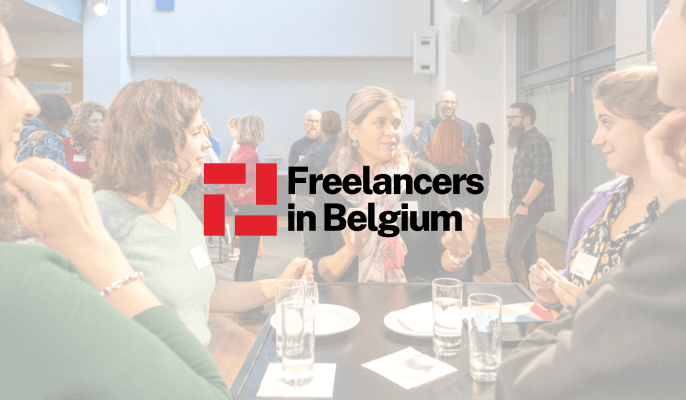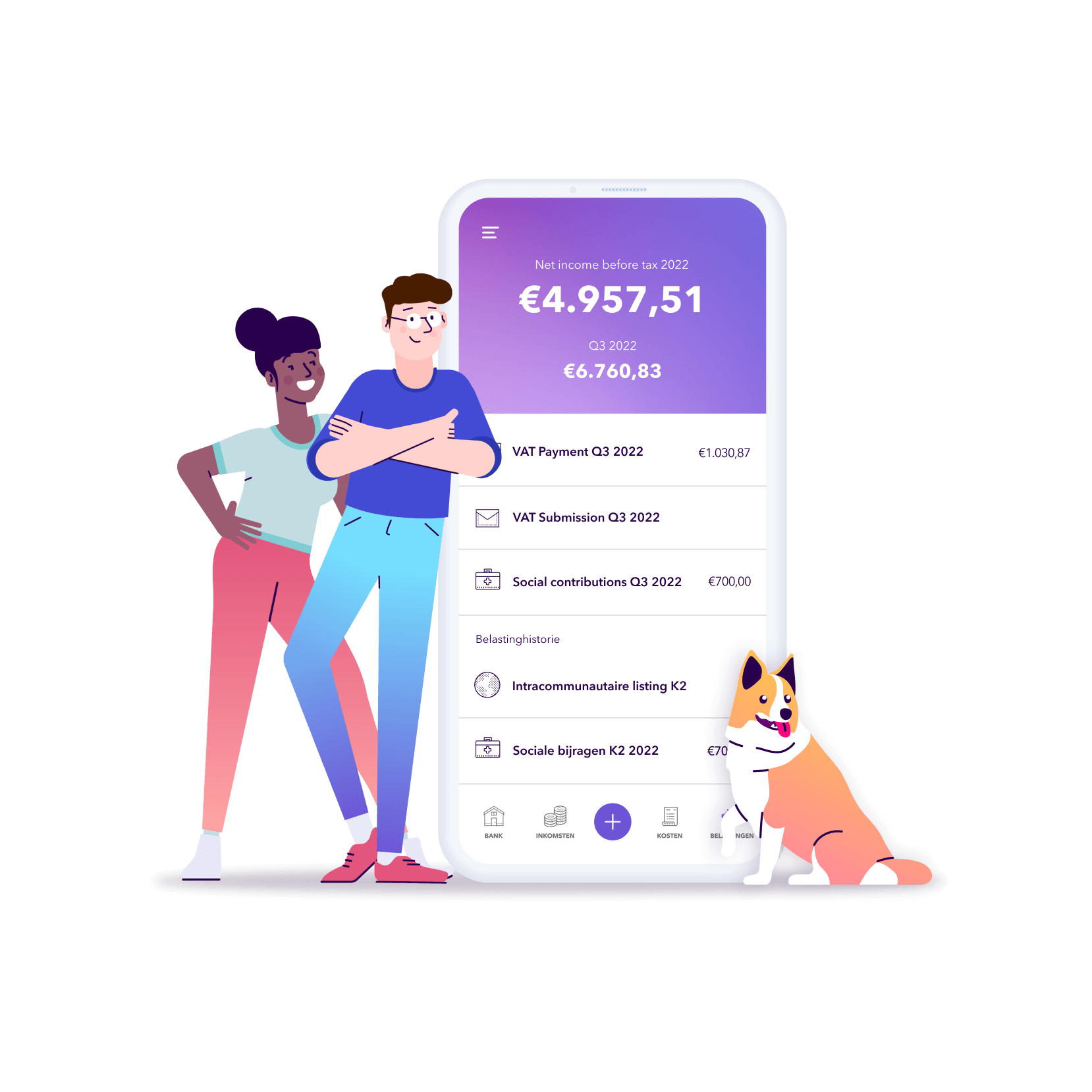
Become self-employed in Belgium in 5 easy steps!
Read in 6 minutes
There you go, it’s decided! You’re going to become self-employed. Congratulations! But where exactly do you start, and what do you need to consider? What should you pay attention to and what can you absolutely not forget? There’s a massive amount of information coming your way, and it’s easy to get lost in the administrative maze. We know because we’ve been there too. That’s why we’re sharing everything we wish we’d had known when we started, on a silver platter!
Become self-employed in 5 steps
Follow the steps below for a quick, successful, and mishap-free start to your self-employed adventure. Let’s begin!
Start with a well-thought-out business plan
- Ask yourself the right questions
Before you dive into your brand-new adventure as a self-employed individual, it’s important to pause and think about the purpose of your business.
What exactly will you do, and what services or products will you offer? If you choose to sell or make products, who will be your supplier? What profit margin can you apply, and what prices will you set? Who are your ideal customers, and how much profit do you expect to generate?
These are all important questions to ask yourself before you start. Based on this, you can foresee enough start-up capital and ensure you have everything in place to get off to a good start.
💡Accountable tip: Got a strong business plan but are lacking the financial resources to fuel launching your business? Then be sure to check if you qualify for a start-up loan, transition premium, or the ‘springboard to self-employment’ (Springplank naar zelfstandige/Tremplin-indépendants). These are all government measures created to support people who want to become self-employed.
- Need a diploma, certificate, or permit?
Check whether you can just get started with your activity or if you need to apply for a certain permit or present a specific diploma. Self-employed individuals practising a liberal profession (i.e. dentist, doctor, psychologist, etc.) need an official diploma. For other professions, such as copywriting or web design, you don’t need a specific diploma.
However, the right skills, expertise, experience, and even certificates can give you an advantage over fellow self-employed individuals. After all, the customer wants value for their money.
If you become self-employed in Brussels or Wallonia, you even need to present a business management diploma, as without this proof, you can’t register your business in the Crossroads Bank for Enterprises (CBE). For self-employed individuals based in Flanders, this hasn’t been mandatory since 2018.
- Primary or secondary occupation?
Are you going to spend a few hours a week on your self-employed activity alongside your salaried job? Then the status of self-employed in a secondary occupation might be something for you. Or do you want to go all in and start as self-employed in a primary occupation?
- Sole proprietorship or company?
Have you also thought about which business form best suits you? Depending on your business plan, there’s surely a business form that fits you better, whether it’s a sole proprietorship or a company.
Here, you can read more about the different forms of business for self-employed individuals in Belgium.
2. Open a professional bank account
Now that you’ve clearly defined what your self-employed activity entails and how you’re going to execute it, it’s time to open a professional bank account. This step is not mandatory if you’re planning to carry out your self-employed activity as a sole trader, but we highly recommend it. For companies, this step is mandatory.
It’s always good to get paid by your customers, of course, but not only that: this account is used for all your professional transactions and appears on all your invoices. You can choose whichever bank you want. You can probably even arrange it all from the comfort of your sofa.
Read more about opening a professional bank account here.
This is also a good moment to think about how you’re going to handle your accounting. Will you hire an accountant, opt for accounting software, or do it yourself?
3. Register your self-employed activity at the Crossroads Bank for Enterprises
Now things start to get real: it’s time to register your self-employed activity at the CBE and get your business number. Keep your identity card and professional bank account number handy, as you’ll need this information during registration. Fill in all the details as fully and accurately as possible, because once your registration is submitted, it’s final. You pay administrative fees for any changes.
Finding this registration complex? Then get help from an accountant, a business counter, or one of the Tax Coaches at Accountable.
Almost immediately after registration, you receive your unique business number. Your business is now registered in the CBE, among the data of thousands of other self-employed individuals and Belgian companies.
Expect to spend about €170 to get your registration as a self-employed individual sorted. This is also your first official business expense, which is 100% tax-deductible. Yay!
Registration in the CBE costs €105.50 and activation of your VAT number is around €60. Prices vary depending on whether you do the registration yourself or have it done by your social secretariat.
You can read more about deductible expenses here. It’s worth remembering that you can claim business expenses retroactively, up to 3 months before you officially start being self-employed!
💡Accountable tip: It’s best to start your self-employed activity at the beginning of a quarter (January 1, April 1, July 1, or October 1). Of course, you can start at any other time, but you pay social contributions for a full quarter. If you register as self-employed at the end of a quarter, you still pay the full social contribution for a quarter that’s almost over.
4. Join a social insurance fund
You’re your own boss… which has its charms, but there are also risks involved: having the right cover if something goes wrong comes down to you, and you alone. That’s why you have to join a social insurance fund before starting your activity.
It’s your fund that takes care of your family allowances (child benefit), pension, sickness or disability insurance, as well as the bridging right (after bankruptcy).
To enjoy this protection when it’s needed, you pay a social contribution to your social insurance fund every quarter. The amount depends on your income but is about 20.5% of your taxable net income. Moreover, your social contribution is 100% tax-deductible.
When you start out, you don’t know exactly how much you’re going to earn. You can choose to pay the minimum contribution or opt for a higher amount that you estimate yourself. When the tax authorities tell your social insurance fund exactly how much you earn, your contribution can be revised.
5. Sort out the VAT formalities
You already have your business number, but in most cases, you also need to activate your VAT number. This is the same number as your business number, but with ‘BE’ in front. You get your VAT number from the tax authorities via this form. Too complex to navigate it yourself? Then your social insurance fund can activate your VAT number for you, for a small fee.
Once your VAT number is activated, you’re then obliged to charge VAT to Belgian customers and submit periodic declarations (usually quarterly). You must also submit a customer listing, which you can read more about here.
In principle, all self-employed individuals in Belgium are subject to VAT, but Belgium wouldn’t be Belgium if there wasn’t an exception. If your annual turnover is below €25,000, you qualify for the VAT exemption scheme for small businesses. This means you don’t have to charge VAT to customers or pay it back to the state, but on the other hand, it also means you can’t deduct or recover VAT on the professional expenses you incur.
Certain professions, such as doctors or dentists (i.e. liberal professions), are not subject to VAT at all. In this case, they are not subject to VAT because of the nature of the profession.
6. Get to work!
Hey, didn’t you say 5 steps? We did. The 6th and final step is the real start of your brand-new adventure in self-employment.
Now, you just need to work and reap the fruits of your labour as a self-employed individual. Or rather, part of the fruits. From the total amount of money your customers pay you, only a part goes into your own pocket. The other part is used to run your business (professional expenses), and the rest is taxed at a higher or less high rate, depending on whether you earn a lot or a little.
Other interesting reads for you:
Gross and net income for self-employed individuals: how to calculate your net income
The progressive tax brackets for self-employed individuals in Belgium
Customers pay you. You pay your suppliers. You keep all your paperwork neat and well organised. You respect the deadlines. To find your way in this new labyrinth, there’s a handy, pocket-sized solution that can guide you: Accountable. ✨
Thanks to our app, you can record your expenses, create and send invoices, follow up on payments, and know which taxes are coming up. By self-employed individuals, for self-employed individuals. Because we would have liked it to be easier too.
We’re happy to help you on your way. 💜
Did you find what you were looking for?
Happy to hear!
Stay in the know! Leave your email to get notified about updates and our latest tips for freelancers like you.
We’re sorry to hear that.
Can you specify why this article wasn’t helpful for you?
Thank you for your response. 💜
We value your feedback and will use it to optimise our content.










